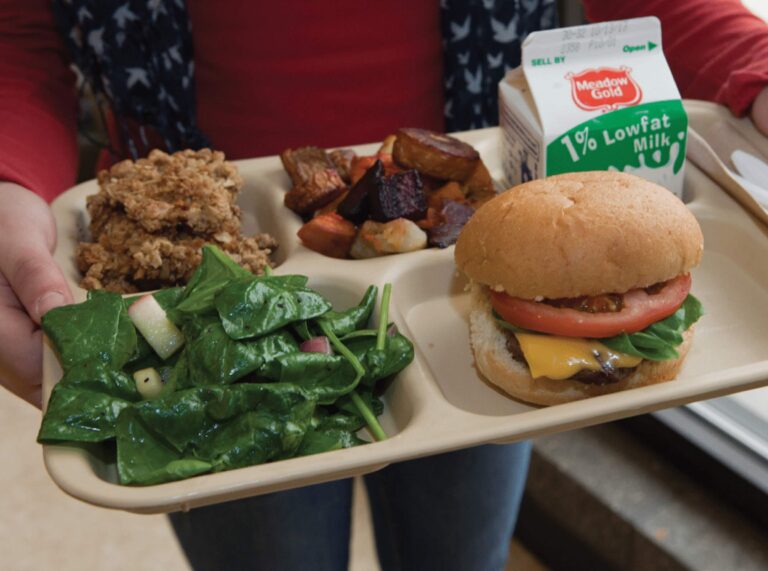The Policy Brief, Summer 2024: Why Summer EBT Matters
The policy updates you need to know this month.
Join our corps! Applications for 2026-2027 are now open. Apply by March 30.
The policy updates you need to know this month.

The summer solstice has passed and the days are gradually starting to shorten, but we hope you’re making the most of the summertime anyway. As school winds down for our corps members and their students, we’re still staying tuned to child nutrition policy that affects kids in the summer months and all year long.
Here’s a quick roundup of recent federal and state policy developments we’re watching so you can get back to pursuing the summer of your dreams.
Last month, the Biden-Harris administration launched SUN Programs, a policy package of three summer school meals programs meant to help improve nutrition security for kids and teens during the summer months. You may be familiar with two of the programs, SUN Meals and SUN Meals To-Go, but the new Summer EBT benefit, SUN Bucks, is a new policy effort from the White House to promote food and nutrition security.
The evidence-based SUN Bucks program will provide eligible school-aged children with a $120 grocery benefit this summer. An expected 21 million children will benefit from the program, allowing families and caregivers to expand their summer grocery budget to buy foods that best suit their family’s needs, cultural traditions, and preferences. Families with eligible children currently receiving SNAP and WIC will automatically be enrolled in SUN Bucks; others will need to apply each year. Not every state is participating, so here’s a tool to find out if your state is one of them and learn how to apply.
Research shows that this type of summer grocery benefit can reduce child hunger by 33%. It also shows that children who participate consume more whole grains, dairy, fruits, and vegetables.
Here are the two other summer meal programs offered alongside SUN Bucks:
Last month, both House Agriculture Chair Glenn “GT” Thompson and retiring Senate Agriculture Chair Debbie Stabenow released their competing plans for the Farm Bill. Concern is growing that partisan disagreements, like those demonstrated in the rival plans, may delay policy progress beyond the September 30 reauthorization deadline.
While the House Committee on Agriculture’s recent vote to move the bill forward marked the first major step toward its passage, we’re far from out of the woods. It’s possible that despite current efforts, fall elections will play a significant role in shaping the bill’s future, and an extension will likely be considered toward the end of the year.
The Farm Bill is a massive piece of legislation setting the policy for many of our nutrition and agriculture programs, and its impact on child food security cannot be overstated. It is typically up for reauthorization every five years, but recently, extensions have pushed back the timeline. We need Congress to ensure that provisions in the Farm Bill strengthen the policies that defend against hunger for millions of children.
The Massachusetts Senate Ways and Means Committee Budget included an amendment to fund $750,000 in continued farm to school grants and $250,00 for school wellness coaching—in part due to FoodCorps’ advocacy efforts alongside our coalition partners in the state. Still, advocacy is needed to secure these funds in the FY25 budget. Visit MA Food for MA Kids to learn more.
The Michigan legislature passed its general and state school aid budgets for FY25, maintaining full funding for free school meals but cutting the state’s landmark Farm to School nutrition incentive in half. While FoodCorps celebrates that students in Michigan will continue to access free school lunch and breakfast, cuts to the 10 Cents a Meal program will significantly reduce valuable benefits for students and communities.
Looking forward, FoodCorps continues to advocate that lawmakers in Michigan pass policy measures that permanently keep free school meals for all and strengthen investments in programs like 10 Cents a Meal, recognizing the enhanced nutritional, educational, and economic benefits of farm to school programs.
The New Jersey Office of the Food Security Advocate is tasked with forming a working group for School Meals for All. FoodCorps and our partners at the School Meals for All NJ campaign will join the group to help shape recommendations for the upcoming year. Planning efforts are underway to reach families eligible for expanded meal access and engage in the campaign for healthy school meals for all New Jersey students.
Are you attending the National Urban League Conference in New Orleans? Don’t miss the LED talk from FoodCorps’ President and Co-CEO, Dr. Robert S. Harvey. Whether you’re attending the event or somewhere nearby, send Ashanti Lewis, our Director of Federal Government Relations, a message to connect.
FoodCorps applauds the state of Rhode Island and the Rhode Island Healthy School Meals Coalition for expanding access to school meals this legislative session. Funding secured in the final state budget ensures that 6,500 children in households who currently receive reduced-price meals at school will now get those meals free of charge. This is a step in the direction of free meals for all for Rhode Island, and will make a meaningful difference for households across the state next school year.
Want to stay in the loop? Sign up for our policy and advocacy emails!

3 Reasons We Need School Meals for All

Mindful Tasting: Eating with All 5 Senses

Our 2025 Child Nutrition Policy Year in Review